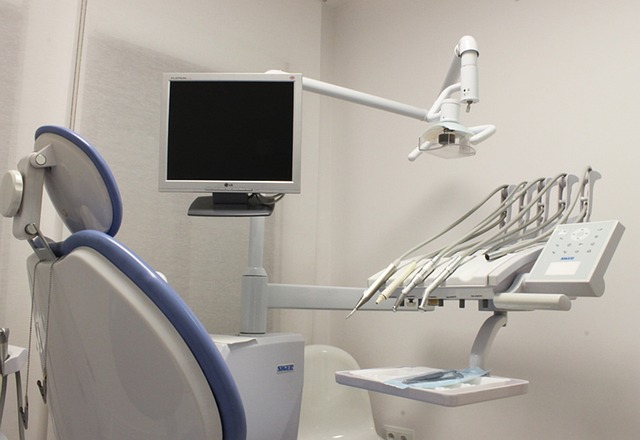Dental Malpractice Insurance is a vital safety measure for dentists, protecting them from financial losses due to patient care issues, including injuries or damage to oral health. This coverage shields against lawsuits by covering medical expenses and legal fees. Key elements in risk management strategies, policies vary from general to specialized, tailored for specific procedures. By offering financial safeguard and peace of mind, this insurance enables dentists to focus on patient care. When selecting coverage, consider specialty risks, potential claim exposure, and policy details. Understanding the claims process is crucial for smooth operations. Dental malpractice insurance is an indispensable net against financial and reputational risks, fostering trust between dentist and patient.
In the high-stakes world of dentistry, protecting your practice and patients with robust dental malpractice insurance is non-negotiable. This comprehensive guide explores DDS-focused liability insurance options, providing insights into essential coverage, policy types, and key benefits. Learn how specialized dental insurance navigates complex scenarios, from routine errors to unexpected crises, offering peace of mind for both practitioners and their valued patients. Discover the factors guiding selection, real-world case studies, and expert advice on managing claims, ensuring your dental practice is shielded against potential risks.
- Understanding Dental Malpractice Insurance: Coverage and Importance
- Types of DDS-Focused Liability Insurance Policies
- Key Features and Benefits of Specialized Dental Insurance
- Factors to Consider When Choosing Dental Malpractice Coverage
- Claims Process and Common Scenarios in Dental Practices
- Case Studies: Real-World Examples of Dental Malpractice Insurance in Action
Understanding Dental Malpractice Insurance: Coverage and Importance

Dental Malpractice Insurance is a crucial safety net for dentists, safeguarding them against potential financial risks associated with patient care. It covers a wide range of scenarios where a dentist’s treatment or decision leads to adverse outcomes, such as injury or damage to a patient’s oral health. This insurance is designed to protect dentists from costly lawsuits and settlement claims, which can significantly impact their practice and personal finances.
The coverage typically includes compensation for medical expenses incurred by the patient due to the dental malpractice, as well as legal fees associated with defending against any resulting lawsuits. By having this insurance in place, dentists can focus on providing quality care knowing that they are protected from unexpected financial burdens. It’s a vital investment for any dental professional to maintain peace of mind and ensure the sustainability of their practice.
Types of DDS-Focused Liability Insurance Policies

Dental professionals, especially those specializing in complex procedures, should consider dental malpractice insurance as a crucial component of their risk management strategy. This type of liability coverage is designed to protect dentists, dental surgeons, and other healthcare providers against potential claims of medical negligence. When choosing a dental malpractice policy, several options are available, each catering to different needs.
The most common types of DDS-focused liability insurance policies include general dental malpractice insurance, which covers a wide range of errors and omissions during dental treatment. Additionally, specialized policies may be tailored for specific procedures like endodontics or orthodontics, offering more targeted protection. Some insurers also provide coverage for professional liability, ensuring against claims related to the quality of care provided, while others might include business interruption coverage, crucial for practices facing unexpected closures due to lawsuits or other issues.
Key Features and Benefits of Specialized Dental Insurance

Specialized dental insurance, also known as dental malpractice insurance, offers practitioners protection against potential risks and claims. This type of coverage is tailored to meet the unique needs of dentists, ensuring they have comprehensive financial security during their careers. Key features include broad liability protection, covering various aspects of dental practice, from diagnostic errors to surgical mishaps. It also provides legal defense expenses, offering peace of mind when navigating complex legal scenarios.
The benefits extend beyond financial safeguard. Dental malpractice insurance offers a safety net, allowing dentists to focus on patient care without constant worry. It encourages ethical practices by ensuring professionals are financially protected during critical decision-making processes. This specialized coverage is particularly valuable given the intricate nature of dental procedures, making it a vital tool for navigating the challenges of modern dentistry.
Factors to Consider When Choosing Dental Malpractice Coverage

When selecting dental malpractice coverage, several key factors come into play. First and foremost, consider the scope of your practice—different specialties may carry varying risks, requiring tailored policies. For instance, a cosmetic dentist’s needs might differ from a general practitioner’s. Next, evaluate potential exposure to claims and lawsuits. This includes assessing the nature of your patient base, treatment complexity, and local legal landscapes.
Additionally, examine policy limits and exclusions carefully. Understand what’s covered and what isn’t; specific procedures or conditions may be excluded. Look for policies offering comprehensive protection, including defense costs and settlement fees. Reputable insurance providers should also provide transparent claims handling processes and responsive customer support.
Claims Process and Common Scenarios in Dental Practices

In any dental practice, understanding the claims process and potential scenarios is vital for ensuring smooth operations and managing risks effectively. Dental malpractice insurance plays a crucial role in safeguarding dentists and their practices against financial losses resulting from professional negligence. The claims process typically involves receiving an allegation or notice of potential malpractice, followed by a thorough investigation. The insurer will gather evidence, consult with experts, and assess the validity of the claim. If found liable, the insured dentist’s policy will cover the settlement expenses, legal fees, and any judgments awarded to the plaintiff.
Common scenarios in dental practices include misdiagnosis, treatment errors, or failures to obtain informed consent. For instance, a patient may sue if a dentist fails to diagnose an oral condition correctly, leading to unnecessary procedures or delayed treatment. Another scenario could be a tooth extraction mistake, causing damage to nearby structures. Informed consent is also essential; patients should understand the proposed treatment plan, risks, and alternatives before agreeing. Dental malpractice insurance protects against such claims, providing financial security and peace of mind for dental professionals.
Case Studies: Real-World Examples of Dental Malpractice Insurance in Action

In the realm of dentistry, where precision and expertise are paramount, dental malpractice insurance stands as a crucial safety net for professionals facing potential lawsuits. Case studies offer tangible examples of how this coverage can shield dentists from the financial and reputational repercussions of medical mistakes. For instance, consider a scenario where a dentist inadvertently injures a patient during a routine procedure due to equipment malfunction. With comprehensive dental malpractice insurance in place, not only is the financial burden of legal fees and potential damages covered, but the insured dentist can also maintain their professional standing, ensuring continuity of care for future patients.
Another real-world example involves a misdiagnosis that leads to inappropriate treatment. Thanks to dental malpractice insurance, the affected patient can seek compensation while the practicing dentist is protected from having their license revoked or facing prolonged legal battles. These case studies underscore the indispensable role dental malpractice insurance plays in fostering trust between dentists and patients, enabling them to focus on delivering quality oral care without constant worry about financial exposure.
